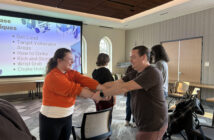
Kendal Jacobus
It’s not easy to solve problems. It’s rare lately for people to truly dig beneath the surface and answer the “whys” and “hows” of life instead of just the “whats.” In my eyes, this struggle is especially apparent in our generation’s way of navigating overall health and wellness.
Other generations probably assume we are diet-crazed, body-image obsessed and workout possessed. Studies, however, are proving those assumptions couldn’t be more wrong. In fact, the more scientists dig for our real opinion of health, they find that our only opinion is that they don’t really care about the latest weight loss strategies and diets at all.
According to International Food Information Council Foundation’s 2015 Food and Health Survey, “Millennials acknowledge the importance of eating healthy, but all admit they do not always eat as healthfully as they would like.” In fact, in another survey done by the IFIC in 2015, it was found that fewer millennials have adopted healthful habits compared to the rest of the population.
Personally, these statistics are no surprise. Technology makes information too accessible, shoved in my face at all times. Every quick fix, how-to and toning exercise I could ever want to know, I can access. But deciphering what opinion, fact and trend to trust my health with based on shallow testimonies and reviews is scary. Because I was mainly exposed to an overwhelming amount of surface-level solutions, it used to be hard for me to invest in my health and wellness on any deeper level.
Even worse, overwhelmed young women like me are turning to their in-shape friends for advice on how to get their body type. The 2015 Food and Health survey results reported “41 percent of millennials are turning to a friend or family member for accurate food information, compared to 34 percent of the general population.”
The same survey also found that when a healthy friend or family member isn’t an option, we are more likely to trust a nutrition or proclaimed “foodie” blogger with their health transformation.
These results indicate the small percentage of our generation taking to diets and health trends are only doing so when they make a personal connection through them. Although support in an individual’s health journey is important, these kinds of social media connections are detrimental because they are motivated by unhealthy and unrealistic expectations. Many popular health figures on social media are praised by followers who want to look more like those people, not because they want to improve their overall health. There is a difference.
I never felt the need to fully understand food and how it affects my energy, beauty and mentality until I was diagnosed with hypothyroidism. These health issues motivated me to understand how to improve my health from the inside out, instead of how to fit into a new pair of skinny jeans.
This perspective of health is something I feel is completely unaddressed in our society’s body-image movement.
The truth is, if body-image campaigns truly wanted to shift the social definition of “healthy,” they would advertise pictures of healthy organs, healthy skeletal structures and the health benefits of real foods. But instead, by advertising people of different shapes and sizes, they are simply endorsing more body images that are equally unhealthy in different ways.
Better yet, if companies selling processed food truly wanted to provide their consumers with healthier products, they would change the ingredients, not the calorie counts.
Instead, the government, economy and media continually chooses to endorse a shallow perspective of health, and consequently so does our society. If we would learn to appreciate the nutritional and biological effects that different foods and drinks have on their blood, muscles, bones and organs, then achieving a healthy, thin, toned and strong physique would be easier than any method endorsed by who they follow on Twitter and Instagram. But it is hard for our generation to see the internal importance of health when society only acknowledges the external.
Until everyone decides to value our internal health, the numerous diets, health figures and fitness trends will continue to push millennials and other generations further away from the truly attaining a healthy body and mind.
_
Kendal Jacobus, ’18, is an associate sports editor for The Brown and White. She can be reached at knj218@lehigh.edu.





Comment policy
Comments posted to The Brown and White website are reviewed by a moderator before being approved. Incendiary speech or harassing language, including comments targeted at individuals, may be deemed unacceptable and not published. Spam and other soliciting will also be declined.
The Brown and White also reserves the right to not publish entirely anonymous comments.
1 Comment
The same or similar problems exist in the community at large. It is good to see more people waking up to food issues over the last 10 years or so, but getting the truth is not easy with social media and other websites that exist only to sell advertisements. (Facebook and the other social media platforms aren’t there to help you share things or connect with others — they’re there to collect information on your interests & preferences so they can target ads. And many websites that portray themselves as information sources are also there primarily to present you with ads that cater to your interests.)
People interested in learning more about the food-health-climate connections — and what can be done to make things better — might be interested in our Food, Climate, Health internship, also known as Healthy Food for Healthy Communities [#32885174 on LUCIE].